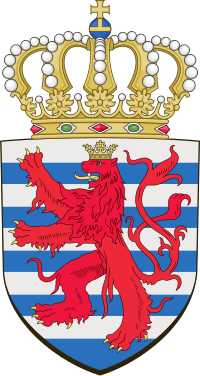Luxembourgish nationality law

Luxembourgish nationality law is ruled by the Constitution of Luxembourg.
The Grand Duchy of Luxembourg is a member state of the European Union and, therefore, its citizens are also EU citizens.
Since 1 January 2009, Luxembourg has allowed dual citizenship.[1] Since then, many Belgians have made use of the new law to adopt Belgian-Luxembourgish citizenship, especially Belgians living in Arelerland, a part of the Belgian province of Luxembourg at the border with the Grand Duchy.[2]
One may request Luxembourgish nationality through naturalisation under several conditions:
- being at least eighteen years old
- living there for seven consecutive years [3]
- passing an exam testing knowledge of the Luxembourgish language
- taking courses of "civic instruction" (about Luxembourgish institutions, law, etc.)
It is also possible to "recover" Luxembourg nationality if one can prove he had an ancestor who was Luxembourgish as at 1 January 1900. The Luxembourg diaspora at the time moved to France, Belgium and the US. As at end of 2013, thousands of people recovered the nationality of their Luxembourgish ancestor.
Citizenship of the European Union
Luxembourgish citizens are also citizens of the European Union and thus enjoy rights of free movement and have the right to vote in elections for the European Parliament.
Travel freedom of Luxembourgish citizens
Visa requirements for Luxembourgish citizens are administrative entry restrictions by the authorities of other states placed on citizens of Luxembourg. In 2015, Luxembourgish citizens had visa-free or visa-on-arrival access to 171 countries and territories, ranking the Luxembourgish passport 3rd in the world according to the Visa Restrictions Index.
References
- ↑ "Dual Citizenship". Washington, D.C.: Embassy of Luxemburg. Retrieved 2009-02-12
- ↑ "Veel Belgen willen ook Luxemburger worden" (in Dutch). 2011-01-21. Retrieved 2011-01-22.
- ↑ http://www.mj.public.lu/nationalite/droit_nationalite.pdf
External links
- (French) Luxembourg's Ministry of Justice website
- (French) About the new nationality law
- Part of the Constitution about the citizenship rules
